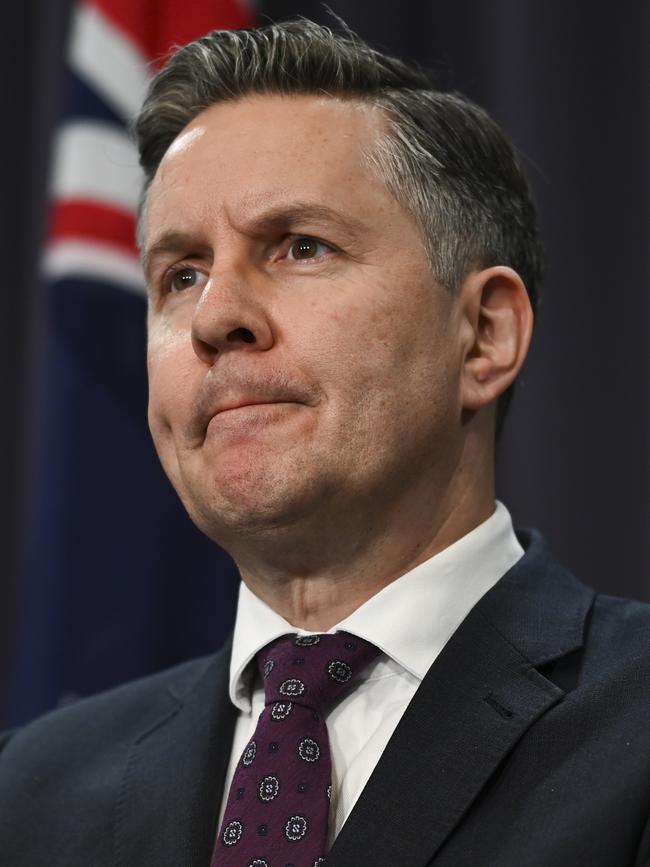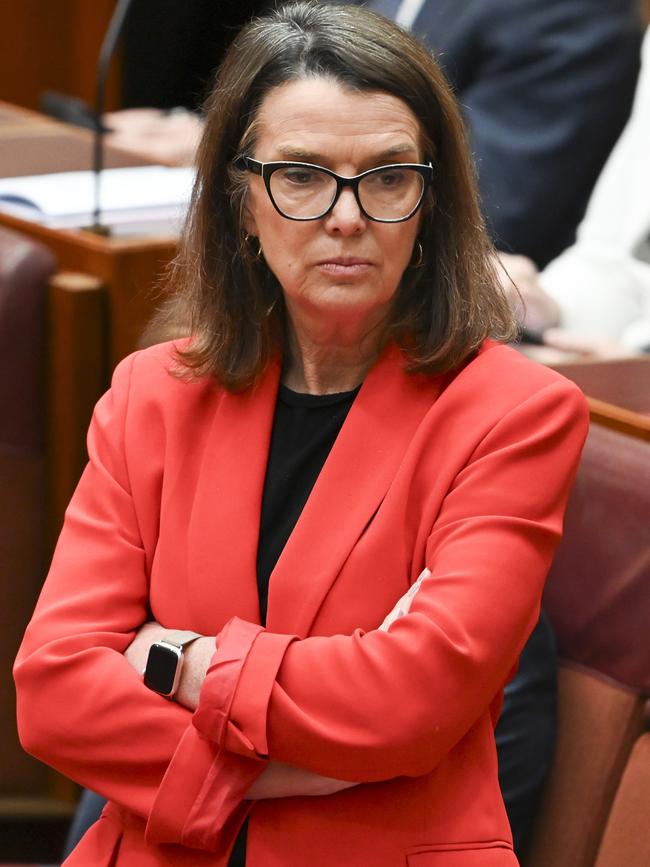Drug authority decision wipes dozens of lifesaving new medicines from pipeline
Cancer treatments and chronic-disease medications are among the drugs deferred in a shock decision by the government’s advisory body for drug subsidies, which has left 45 new medicines stalled without discussion.

Federal Health Minister Mark Butler has proposed an emergency meeting of the government’s independent drug subsidy body after it announced a limit on the number of products it would assess, wiping dozens of new medicines from the pipeline.
The Australian understands cancer treatments and chronic-disease medications are among the drugs deferred in the shock decision, with delays of at least four months expected to their potential PBS listing.
At the end of October, the Pharmaceutical Benefits Advisory Committee, an independent arbiter tasked with determining which new drugs should be recommended for subsidy, announced it had pushed 45 submissions from the agenda of its March 2025 meeting. Of those delayed, 24 were deemed “major” submissions.
Simultaneously, it advised it would institute a “maximum total number” of drugs considered at each meeting.
In a public memo released by the Pharmaceutical Benefits Scheme, the independent agency outlined its process for managing the March 2025 agenda.
“The Committee … agreed that any 3-day meeting capacity includes a maximum total number of cost-effective analysis submissions,” the memo reads.
“This process has indicated that the number of submissions requiring clinical and economic evaluation expected to be presented for the March 2025 PBAC meeting cycle significantly exceeds the capacity available to undertake the technical evaluations necessary for PBAC preparations and progression to Committee considerations.”
Mr Butler said he was concerned with the PBAC decision and had entered discussions with the peak pharmaceutical representative Medicines Australia.


“I’m deeply concerned that PBAC will not consider these submissions,” he said. “Submissions should be dealt with in the timely way that sponsors and patients expect.”
“I’ve directed my department to urgently engage with Medicines Australia to examine all potential solutions. All options need to be on the table to ensure that these applications are being considered, including scheduling an additional meeting of the PBAC.
“My focus is on making sure patients get access to life-changing treatments as quickly as possible.”
Opposition health spokeswoman Anne Ruston said the new maximum submission capacity “effectively pursues a cap on medicines for the first time in history”.
“We are really concerned that almost 50 medicines have been deferred from consideration for listing on the PBS,” Senator Ruston said.
“There is no doubt that this will result in serious delays for patients waiting to have access to these potentially lifesaving or life-changing medicines at an affordable price.
“The Health Minister must immediately outline what steps he is taking to ensure that patients are not subjected to even further delays in critical new medicines being listed on the PBS. Patient lives depend on it.”
The Australian understands from October 22 the Health Department advised individual pharmaceutical companies of the delay. The delayed submissions were not made publicly known, but this masthead understands cancer treatments and chronic disease medications were among the drugs deferred.
The medicines deferred are not guaranteed a place on the agenda of the July 2025 meeting, adding at least 120 days of delay to their potential PBS listing.
There were 77 drugs submitted to the March 2025 PBAC agenda, making it the most high demand of any meeting historically. Fifty-six were submissions for major drugs and 21 were deemed minor. However, by reducing its considerations to 32 at the March meeting, it has set an agenda shorter than the nine meetings prior.
Annual reports from the Health Department show 50.7 total submissions were considered on average at PBAC meetings between July 2021 and March 2024.
In March 2022, a PBAC hearing provided recommendations on 65 new drugs, while four outcomes were deferred based on discussion.
The most recently publicly available hearing in July 2024 provided recommendations on 32 drugs; three decisions were deferred to the next meeting, while another two were deferred based on discussion.
In 2011, the Gillard government deferred subsidising seven PBAC PBS recommendations based on budgetary considerations. In that case the drugs had gone before the PBAC and been recommended, but the government delayed subsidising them.
It faced widespread condemnation from pharmaceutical companies and patient advocacy groups and prompted the 2011 parliamentary committee into the government’s administration of the PBS.
“Labor has a worrying track record on this,” Senator Ruston said. “When last in government, they deferred the listings of critical new medicines because they ran out of money. History appears to be repeating itself.
“This is unacceptable, especially when the government has just released their Health Technology Assessment Review, which acknowledges that Australia has fallen behind the pack when it comes to timely access to new medicines and treatments.”
Following the approval of a drug’s registration in Australia by the Therapeutic Goods Administration, a product sponsor – generally the pharmaceutical producer – will apply for government subsidies with the PBS. In order to receive subsidy, the PBS must determine the drug is both cost effective and efficacious, then the incumbent government must agree to fund it.
The PBAC meets three times a year in March, July and November.
The Albanese government has previously worked to speed up its HTA system, implementing a working group to institute the findings of a review that proposed 50 systematic reforms tipped to reduce wait times by 16 months in the majority of cases.
Consumer Health Forum chief executive Elizabeth Deveny said there had to be discussion of whether “the PBAC process is fulfilling the wishes of Australians”.
“PBAC just doesn’t have the funding for it to be able to handle an increase or surge in demand for its services,” Dr Deveny said
“If submissions are going to exceed that number, then there should be a contingency so that it can meet more often and get through more submissions.
“You could argue that there might not be too much impact to consumers with this delay and in fact, it gives those organisations making submissions extra time to improve their submission and make their case for PBS listing stronger.”
Medicines Australia chief executive Liz de Somer called it a “symptom of a broken system”.
“The PBAC must hold additional meetings between March and July 2025 so there are no ongoing delays for patients,” she said.
“It is completely unacceptable that the department does not have a scalable workforce of evaluators in place given the high fees pharmaceutical companies are charged for each submission to be considered, which is over $200,000 per submission. This is not the first time there has been a high number of submissions.
“Advances in research and development mean new medicines are being developed faster, and work differently to current therapies in the market. Regulatory approvals are keeping pace but funding decisions are not, which has led to the current bottleneck.”







To join the conversation, please log in. Don't have an account? Register
Join the conversation, you are commenting as Logout